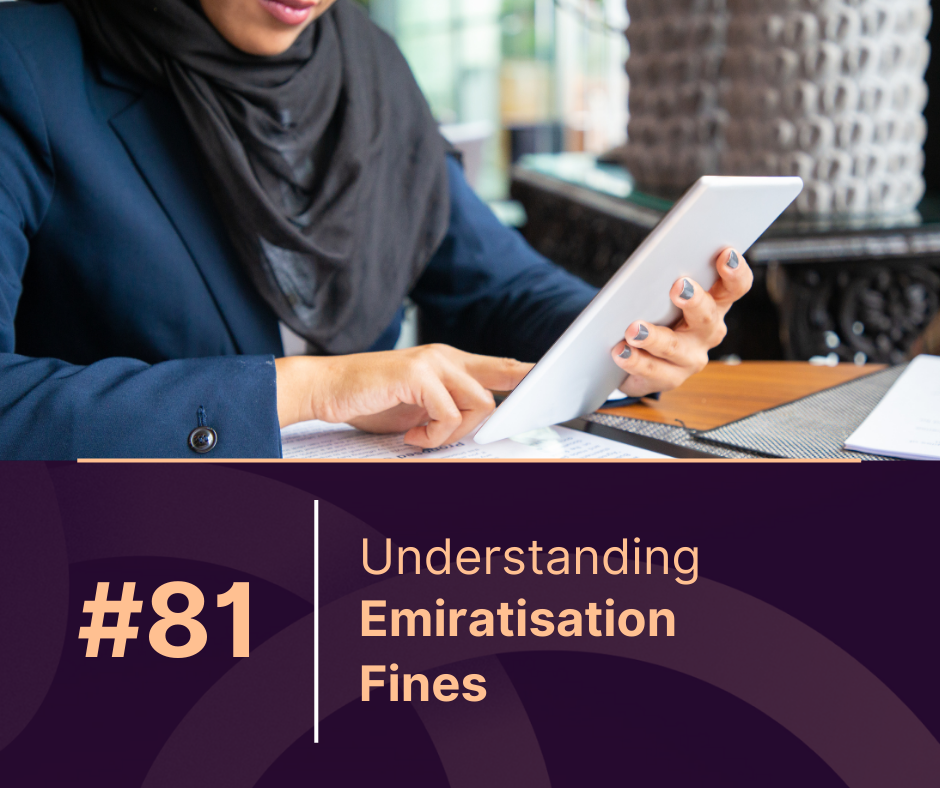Overview
As the UAE government intensifies efforts to boost local employment through Emiratisation, companies operating in the private sector must now adhere to stricter nationalisation targets. With these mandates come clear penalties. In this blog, we break down “Understanding Emiratisation Fines“, including what they are, why they exist, and how HR teams and employers can stay compliant to avoid hefty financial consequences.
The article is essential for UAE business owners, HR professionals, and compliance managers looking to stay updated and avoid non-compliance penalties. understanding emiratisation fines
What is Emiratisation?
Emiratisation is a UAE government initiative aimed at increasing the number of Emirati citizens employed in the private sector. Under the program, private companies are required to hire a specific percentage of UAE nationals as part of a broader workforce nationalisation strategy.
The Ministry of Human Resources and Emiratisation (MoHRE) has implemented strict regulations to ensure compliance, including financial penalties for companies that fail to meet their quotas.
Understanding Emiratisation Fines in 2025
The UAE has introduced monthly penalties for non-compliance with Emiratisation targets. These fines serve as both a deterrent and a motivator for businesses to invest in local talent.
Penalty Breakdown Table
| Company Size (No. of Skilled Workers) | Required No. of Emiratis | Monthly Fine Per Unfilled Role | Annual Fine (If No Compliance) |
|---|---|---|---|
| 50 – 99 | 1 Emirati | AED 7,000 | AED 84,000 |
| 100 – 149 | 2 Emiratis | AED 7,000 | AED 168,000 |
| 150+ | 1 Emirati for every 50 | AED 7,000 per unfilled role | Varies |
“Companies that don’t comply not only risk paying high fines but also risk losing government support and access to tenders.” – MoHRE Statement, 2025
The fine amount is expected to increase by AED 1,000 annually, adding more pressure on employers to act swiftly.
Why These Fines Matter
Non-compliance with Emiratisation doesn’t just mean a financial loss. It can:
- Affect your business reputation in the UAE market
- Block access to certain government contracts
- Lead to downgrading of your company category in MoHRE system
- Disqualify your firm from receiving new work permits
For businesses operating on tight margins, these consequences can be severe and long-lasting.
How to Stay Compliant
- Understand Your Quota: Visit the MoHRE website or contact your PRO to understand how many Emiratis your company needs to employ.
- Partner with Nafis: Leverage the Nafis platform to source qualified Emirati candidates.
- Train and Retain: Offer upskilling programs and career progression to retain Emirati talent.
- Conduct Internal Audits: Regularly review your workforce composition to stay on track.
- Educate Management: Make sure department heads are aligned with Emiratisation goals.
“Emiratisation is not just a compliance checkbox—it’s a long-term talent investment strategy.”
Conclusion
Understanding Emiratisation Fines is crucial for every HR and business leader in the UAE. The financial penalties for non-compliance are real, increasing yearly, and can impact more than just your bottom line. By staying informed, investing in national talent, and collaborating with platforms like Nafis, you can avoid fines and build a more sustainable and locally aligned workforce.
Take proactive steps today to future-proof your organization.
FAQs
Q1: What is the current fine for not hiring the required number of Emiratis?
A: AED 7,000 per month per unfilled Emirati position (as of 2025).
Q2: Will the fine amount increase in the future?
A: Yes, the fine will increase by AED 1,000 annually.
Q3: How can I find Emirati candidates?
A: Use the Nafis platform, job fairs, and partnerships with Emirati training institutions.
Q4: What happens if my company doesn’t comply?
A: Apart from fines, you risk losing access to government contracts, downgrading in MoHRE system, and suspension of new work permits.
Q5: Does Emiratisation apply to all companies?
A: It applies to companies with 50 or more skilled employees, particularly in targeted sectors. understanding emiratisation fines



